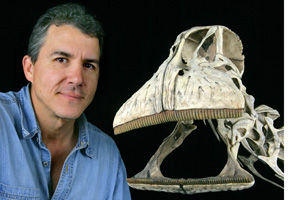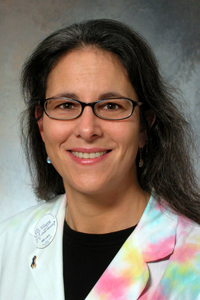Chicago in the News
The Chronicle’s biweekly column Chicago In the News offers a digest of commentary and quotations by a few of the University faculty members, students and alumni who have been headlining the news in recent weeks. Chicago faculty members are some of the most frequently quoted experts, so space allows publishing references to only selected examples. To read many of the full newspaper articles mentioned in this column, visit the In the News column at the University News Office Web site: http://www-news.uchicago.edu.
 Paul Sereno Photo by Mike Hettwer, courtesy of Project Exploration, © 2007 National Geographic |
|
Nigersaurus adds complexity to fossil record
Stories about the discovery of Nigersaurus taqueti—made by a team of paleontologists that Paul Sereno led—were published Friday, Nov. 16 in the Chicago Sun-Times, the Chicago Tribune and The New York Times, after Sereno, Professor in Organismal Biology & Anatomy, unveiled the skeleton of the creature the day before in Washington, D.C. Sereno describes the 110-million-year-old species as a relative of the North American dinosaur called Diplodocus and likens its herbivorous behavior to a modern cow. “This thing was a Mesozoic cow,” said Sereno in the Chicago Tribune story. “We have seen nothing like this dinosaur,” he noted in The New York Times article. “It’s a puzzle that says, ‘figure this out,’ and we think it’s an extreme version of Diplodocus with the minimum amount of body structure it needed.”
Beauty and the risk
David Song, Professor in Surgery and Section Chief of Plastic Surgery, was quoted in a Wednesday, Nov. 14 Chicago Tribune story about the risks of plastic surgery. “On television, people are always having extreme makeovers. People don’t understand it’s real surgery with real risks,” said Song about cosmetic procedures, which are readily available through many doctors’ offices. Peter Angelos, Professor in Surgery and Associate Director of the MacLean Center for Clinical Medical Ethics, pointed out that people often do not weigh the risks against the benefits of a cosmetic procedure. “If, in the surgeon’s judgment, the risks of those procedures are too high, then even if the patient really wants it the surgeon should say, ‘Gosh, I’m sorry, but I cannot offer this to you,’” said Angelos.
Lab High School among best
The University Laboratory High School was part of an article published in the Friday, Nov. 30 Wall Street Journal, which noted that the school is among some of the best high schools preparing young students for college. A survey of eight colleges, which included Chicago—with an admissions selectivity of 18 percent and whose accepted applicants had reading and math SAT scores in the 1350-1450 range—involved researching the high school alma maters of 7,000 students who currently are freshmen at these colleges. Of the students’ alma maters, The Wall Street Journal made a list of schools with graduating classes of at least 50 students, and then calculated the percentage of last year’s graduating class at each high school that had gone on to the colleges in the survey. This percentage was called the “success rate.” The Lab High School placed fifth in the survey with a 19.5 percent “success rate.”
Law School lecturer rising to top
U.S. District Judge Mark Filip, the Bustin Lecturer in the Law School, was nominated as Deputy Attorney General in the U.S. Department of Justice, and stories about the nomination have been published by the Chicago Tribune, the Associated Press, Time and various blogs, including those at The Wall Street Journal and the Washington Post. According to Saul Levmore, Dean of the Law School, Filip is a fine choice for the job. “I think it’s really great that a guy like this gets nominated,” said Levmore, in the Chicago Tribune story. “That he rises to the top is a good sign the system is working.”
Oxford beckons three scholars
Three Chicago students have received Rhodes scholarships to attend Oxford University in England. Isra Bhatty (A.B.,’06), Nadine Levin, a fourth-year in Biological Sciences, and Andrew Hammond (A.B.,’07) have all received the prestigious scholarship. “I think Rhodes looks for well-rounded people. And I have interests from hip-hop to football to being nerdy,” said Illinois native Bhatty, in the Chicago Tribune article published Monday, Nov. 19. Levin and Hammond also fit those criteria. Levin, who plans to study global health sciences at Oxford, is a concert violinist and a competitive Ultimate Frisbee player, while Hammond, who plans to study comparative social policy, is an award-winning opera singer and a fellow at the Center for the Study of Social Policy in Washington. Noting her surprise at being selected for the scholarship, Levin said in a Washington Post article: “I have to sit down and look at my name in order to believe it.”
A monkey book about people
Dario Maestripieri, Professor in Comparative Human Development, was featured on the front page of the Monday, Nov. 19 Chicago Tribune, which reported his research about the Machiavellian behaviors of rhesus macaques. The article noted the female monkeys can be especially ruthless and opportunistic in their political strong-arm tactics. Maestripieri has compiled 20 years of research on these primates for a new book he wrote about rhesus macaques and their human-like behavior. “There are more facts in this book about monkeys than about people,” he said, “but the book is more about people than about monkeys.” A researcher at the Yerkes National Primate Research Center at Emory University said the book, Macachiavellian Intelligence: How Rhesus Macaques and Humans Have Conquered the World, fills a scientific gap.
Where are you on happiness index?
Time Magazine published an article and diagram that is based on findings from a study on happiness and job satisfaction conducted by the National Opinion Research Center at the University. The results put clergy at the top of list of the most satisfied with their occupation and gas-station attendants at the bottom of the happiness index.
 Jill Glick | |
Leader in pediatric forensics
Jill Glick, Associate Professor of Advanced Pediatric Health Services in Pediatrics and Medical Director of Child Protective Services, was featured on the front page of the Monday, Nov. 26 Chicago Tribune for the work she does to protect children from abusive parents or guardians. As a leader in the field of pediatric forensics, Glick has mobilized investigators to look into potential child abuse cases, working regularly with the Illinois Department of Children and Family Services and the police. Glick noted that often there is no formal coordination between the professionals in the medical, law enforcement and social work fields who work to protect children from abuse. “It’s not that people aren’t serious about doing their jobs. It’s just that too often we’re solos, acting alone. A hospital works in its own microcosm. DCFS works in theirs. They’re not evidence collectors. The police are evidence collectors, but they don’t necessarily know how to interpret.” The article also quoted Madelyn Kahana, Professor in Pediatrics.
A tale of Eliade, Doniger and Coppola
Wendy Doniger, the Mircea Eliade Distinguished Service Professor in the Divinity School, was quoted in a Chicago magazine article that reported on a new Francis Ford Coppola film, which is based on Mircea Eliade’s 1976 novella, Youth Without Youth. Doniger, who holds the Eliade professorship, worked with the former Chicago professor who taught the history of religions during the last eight years of his life. She also grew up with Coppola on Long Island, N.Y. She recommended the novella to Coppola, who then began to write the screenplay for Youth Without Youth. Said Doniger of the novella, “It still has a lot to teach people.”
![[Chronicle]](/images/sidebar_header_oct06.gif)